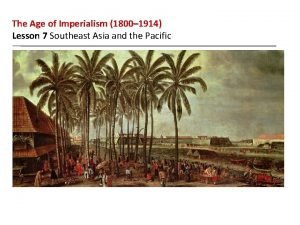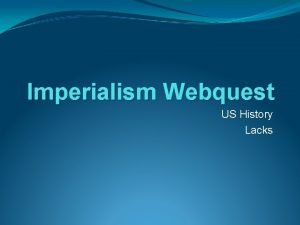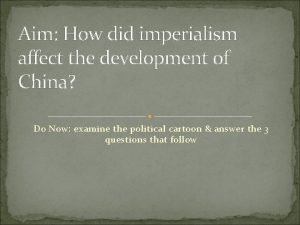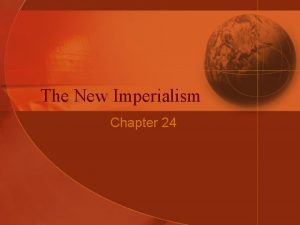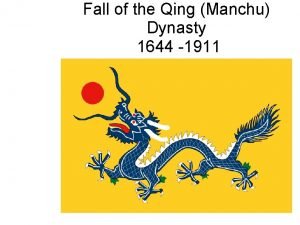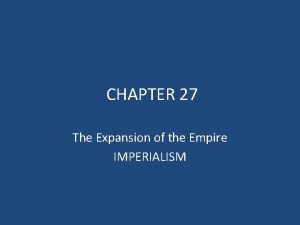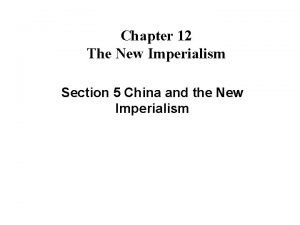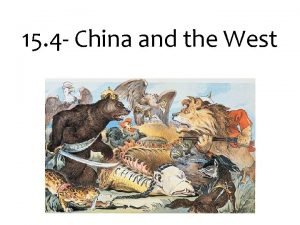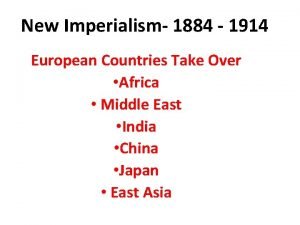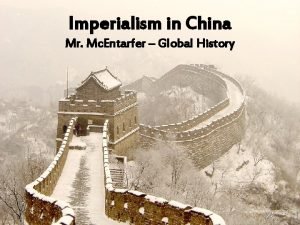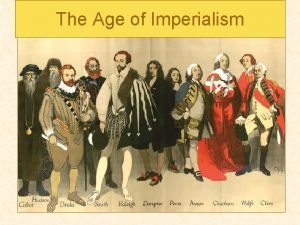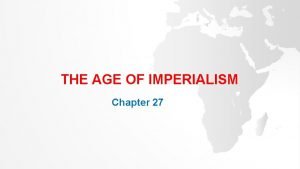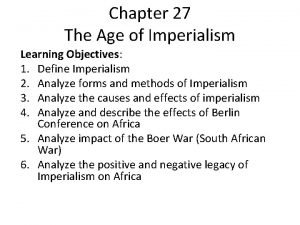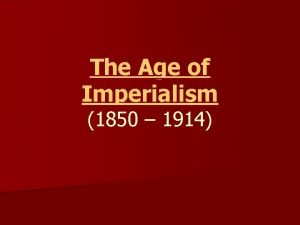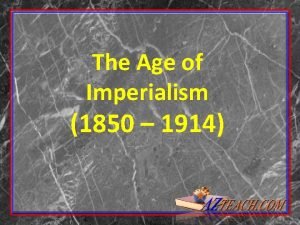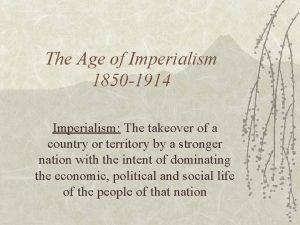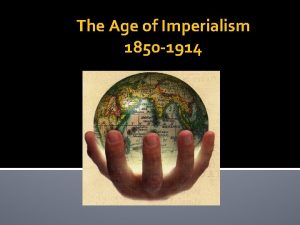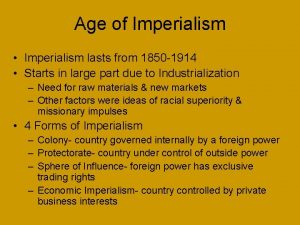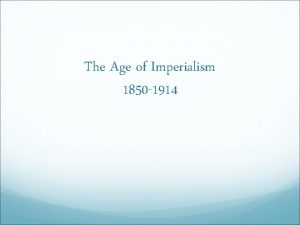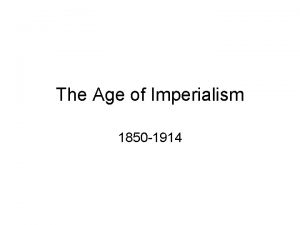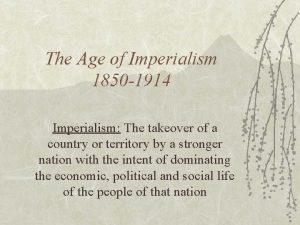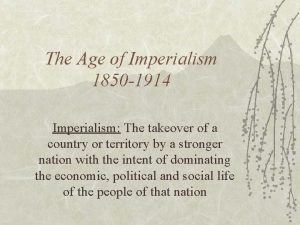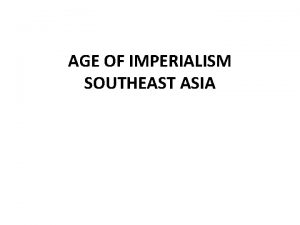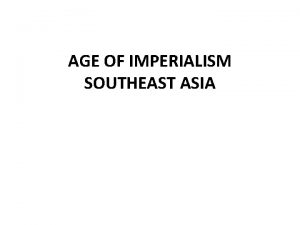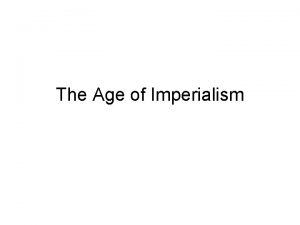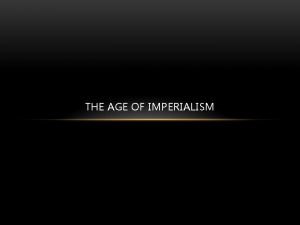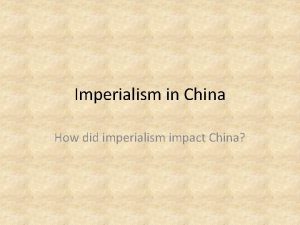Unit 6 Age of Imperialism 1850 1919 CHINA
















- Slides: 16

Unit 6 Age of Imperialism (1850 -1919) CHINA

FACTS ON CHINA Wealth of resources that attracted western nations Tradition of weak central government Slow to industrialize Lack of commitment / opportunity to modernize Weak / disorganized army No navy

FACTS ON CHINA No pressure to expand overseas – possessed large land mass to accommodate large population Large borders harder to defend Many cultures – many language dialects History of domination by outside forces Strictly controlled trade with foreigners

THE CHINA TRADE Since 1700 most foreign traders were confined in China’s port city of Canton and heavily taxed by the government Great Britain’s East India Company traded British woolens and Indian cottons for Chinese tea, porcelain, and silk. Chinese tea became extremely popular in Britain but British trade goods weren’t as popular in China. SO. . . a trade imbalance between Britain and China occurred.

EVENTS LEADING TO OPIUM “TRADE” The shortage of silver to pay for the tea imports forced the British to trade other goods to bring in a profit. The East India Company was producing opium in India, mainly for its medicinal value Although China’s emperor had banned opium as an illegal drug in 1729, Britain discovered it could make a lot of money by selling opium on the Chinese “black market” through private agencies.

The Opium War • The British came to China demanding that they be allowed to trade freely. When denied, they sold opium (an addictive drug) to the Chinese people in the port city where they were allowed to trade. • The Manchu realized that many of his people were not working because they were only concerned with getting this drug. He ordered the British to stop selling this drug to the Chinese people. • The British refused to stop selling the drug and more people became addicted. • This conflict continued until the Chinese emperor was forced to take more drastic measures. He ordered a ship holding opium to be destroyed. This started a war with the British… and the Chinese lost quickly. • As a result, China had to allow Europeans free trade and give up Hong Kong.

U 6 L 4 Imperialism and China The Opium War

China Japan joined European nations in carving up a weak China – not to rule it, but to exploit China’s resources and create markets for European goods.

China By 1910 Japan, France, Great Britain, Germany, and Russia in establishing “Spheres of Influence” within a China too weak to resist foreign occupation. These spheres were established to exploit China’s resources.

Spheres of Influence • Following China’s loss in the Opium War, they were forced to allow other nations to come in and trade as they wished. • The loss proved their weakness and inability to stop foreign invaders. • Great Britain, France, Germany, Japan and Russia all claimed land in China for themselves. These areas were called Spheres of Influence. In these areas, foreigners could create their own trade rules, build railroads and factories, and if they committed a crime, they were not punishable by Chinese law… they were to be returned to their own country for judgment. • This once great nation was now at the mercy of the rest of the world.

SPHERE’S OF INFLUENCE As a result of unequal treaties, foreign nations were able to carve out areas where only that foreign power had the right to trade with the Chinese.

The Open Door Policy “the U. S. wants a place at the table”

THE OPEN DOOR POLICY Since the U. S. did not have its own sphere of influence in China, the U. S. Secretary of State, John Hay, proposed a policy in 1899 by which all nations would have equal rights to trade in China

THE OPEN DOOR POLICY It is said that, like in a card game, Mr. Hay cleverly played one nation against another in pursuit of this “Open Door” policy

THE OPEN DOOR POLICY In the end, the U. S. got its “Open Door” by securing the agreement of all parties involved – all parties, that is, except China

Assignment: What are the similarities and differences between imperialism in China, India and Africa?
 Contrast siam’s fate to that of burma and vietnam.
Contrast siam’s fate to that of burma and vietnam. Iron age bronze age stone age timeline
Iron age bronze age stone age timeline Iron age bronze age stone age timeline
Iron age bronze age stone age timeline Motives of old imperialism
Motives of old imperialism Old imperialism vs new imperialism
Old imperialism vs new imperialism U.s. imperialism webquest
U.s. imperialism webquest China imperialism cartoon
China imperialism cartoon Chapter 24 section 5 china and the new imperialism
Chapter 24 section 5 china and the new imperialism Chinese old hairstyle
Chinese old hairstyle China and imperialism
China and imperialism Chapter 12 section 5 china and the new imperialism
Chapter 12 section 5 china and the new imperialism Western imperialism in china
Western imperialism in china Imperialize synonym
Imperialize synonym Global history imperialism in china
Global history imperialism in china When did hawaii get statehood
When did hawaii get statehood Chapter 27 building vocabulary the age of imperialism
Chapter 27 building vocabulary the age of imperialism Chapter 27 building vocabulary the age of imperialism
Chapter 27 building vocabulary the age of imperialism
